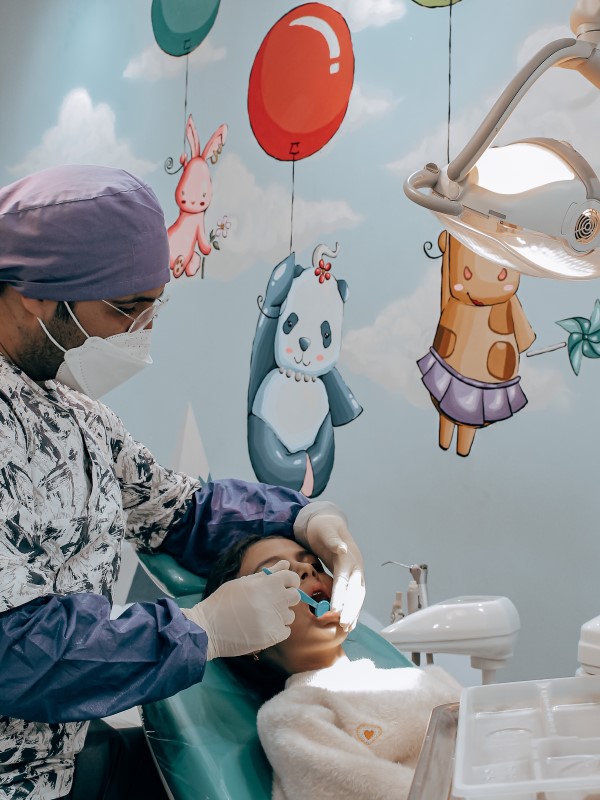Nurturing Healthy Smiles – The Importance of Pediatric Dentistry

As a parent, ensuring your child’s overall health and well-being is a top priority. While regular check-ups with a pediatrician are essential, it’s equally important not to overlook the significance of pediatric dentistry. Dental health plays a crucial role in a child’s development, and early intervention can set the foundation for a lifetime of healthy smiles.
The Importance of Early Dental Care
Pediatric dentistry focuses on providing comprehensive oral health care for infants, children, and adolescents. By starting dental visits at an early age, typically within six months of the first tooth’s appearance or by the first birthday, parents can ensure their child receives the necessary care and guidance to maintain optimal oral health.
Preventing Tooth Decay
One of the primary goals of pediatric dentistry is to prevent tooth decay, which is a common chronic childhood disease. Regular dental check-ups allow the dentist to monitor your child’s oral health, identify any potential issues early on, and provide appropriate treatments or preventive measures, such as fluoride applications or dental sealants.
Establishing Healthy Habits
Pediatric dentists not only provide clinical care but also educate children and parents about proper oral hygiene practices. They teach children how to brush and floss effectively, emphasize the importance of a balanced diet, and help establish healthy habits that will last a lifetime.
The Pediatric Dentist’s Role
Specialized Training
Pediatric dentists undergo additional training beyond dental school to specialize in the unique needs of young patients. They are equipped with the knowledge and skills to provide gentle, compassionate care that helps children feel comfortable and at ease during dental visits. For comprehensive and compassionate pediatric dental care, visit for pediatric dentistry here – https://www.mehravidclinic.com/pediatric-dentistry/, where our skilled team is dedicated to nurturing healthy smiles and promoting lifelong oral health for your child.
Child-Friendly Environment
Pediatric dental offices are designed with children in mind, featuring colorful decor, kid-sized equipment, and often, entertaining distractions like toys or televisions. This child-friendly environment helps alleviate anxiety and creates a positive association with dental visits.

Addressing Developmental Concerns
Pediatric dentists are trained to identify and address developmental issues that may affect a child’s oral health, such as thumb-sucking, pacifier use, or tongue-thrusting. They can provide guidance and interventions to correct these habits and prevent long-term dental problems.
The Parent’s Role
Regular Dental Visits
As a parent, it’s essential to schedule regular dental check-ups for your child, typically every six months. These visits allow the pediatric dentist to monitor your child’s oral health, provide necessary treatments, and offer preventive care.
At-Home Oral Hygiene
Parents play a crucial role in their child’s oral health by promoting good oral hygiene habits at home. This includes supervising and assisting with brushing and flossing, providing a balanced diet low in sugary and acidic foods, and leading by example with their own dental hygiene practices.
Positive Reinforcement
Encouraging a positive attitude towards dental visits is essential. Parents can use positive reinforcement techniques, such as praising their child for good behavior during dental appointments or offering small rewards for maintaining healthy oral hygiene habits.
The Importance of Diet in Pediatric Dentistry
Promoting a Balanced Diet
In addition to regular dental check-ups and good oral hygiene practices, diet plays a significant role in a child’s dental health. Pediatric dentists emphasize the importance of a balanced diet that is low in sugary and acidic foods, which can contribute to tooth decay.
Snacking Habits
Frequent snacking, especially on sugary or sticky foods, can increase the risk of tooth decay. Pediatric dentists encourage parents to limit their child’s snacking frequency and choose healthier alternatives, such as fresh fruits, vegetables, and cheese, which can help stimulate saliva flow and neutralize acid in the mouth.
Meal Planning
Parents can promote their child’s dental health by planning meals that include a variety of nutrient-rich foods, such as whole grains, lean proteins, and calcium-rich dairy products. These foods not only support overall health but also contribute to the development of strong teeth and bones.
The Role of Fluoride in Pediatric Dentistry
Fluoride Treatments
Fluoride is a mineral that helps strengthen tooth enamel and prevent tooth decay. Pediatric dentists often recommend fluoride treatments during regular dental check-ups to provide additional protection against cavities. These treatments involve applying a concentrated fluoride gel or varnish to the teeth, which helps remineralize weakened enamel.
Fluoridated Water and Toothpaste
In addition to professional fluoride treatments, children can benefit from drinking fluoridated water and using fluoride-containing toothpaste at home. Parents should supervise their child’s toothbrushing to ensure they use an appropriate amount of toothpaste and avoid swallowing it, as excessive fluoride intake can lead to dental fluorosis.
Key Takeaways:
- Start pediatric dental visits within six months of the first tooth’s appearance or by the first birthday.
- Pediatric dentistry focuses on preventing tooth decay and establishing healthy oral hygiene habits.
- Pediatric dentists undergo specialized training to cater to the unique needs of young patients.
- Child-friendly dental environments help alleviate anxiety and create positive associations with dental visits.
- Parents should schedule regular dental check-ups for their children every six months.
- Promoting good oral hygiene habits at home is crucial for maintaining children’s dental health.
- Positive reinforcement can encourage children to develop a positive attitude towards dental visits.
Pediatric dentistry plays a vital role in promoting lifelong oral health for children. By starting early, establishing healthy habits, and partnering with a skilled pediatric dentist, parents can help their children develop strong, healthy smiles that will last a lifetime. Remember, investing in your child’s dental health today is an investment in their overall well-being for years to come.
What age should I take my child to the dentist for the first time?
It is recommended to take your child to the dentist within six months of the first tooth’s appearance or by their first birthday. This early visit allows the pediatric dentist to assess your child’s oral health, provide guidance on proper oral hygiene practices, and establish a positive relationship with your child.
How often should my child visit the pediatric dentist?
Children should typically visit the pediatric dentist every six months for regular check-ups and preventive care. However, some children may require more frequent visits depending on their individual oral health needs. Your pediatric dentist will recommend a schedule based on your child’s specific requirements, ensuring optimal dental health.
What can I expect during my child’s first dental visit?
During your child’s first dental visit, the pediatric dentist will gently examine your child’s teeth, gums, and jaw to assess their oral health. They may also clean your child’s teeth and apply fluoride if necessary. The dentist will discuss your child’s oral hygiene habits, diet, and any concerns you may have, providing guidance and answering your questions.
How can I help my child maintain good oral hygiene at home?
To help your child maintain good oral hygiene at home, ensure they brush their teeth twice a day with a soft-bristled toothbrush and fluoride toothpaste. Assist them with brushing until they are capable of doing so effectively on their own. Encourage a balanced diet low in sugary and acidic foods, and limit frequent snacking.
What should I do if my child has a dental emergency?
If your child experiences a dental emergency, such as a severe toothache, a knocked-out tooth, or a broken tooth, contact your pediatric dentist immediately. They will provide guidance on how to handle the situation and schedule an emergency appointment if necessary. In the meantime, keep your child calm and follow any instructions provided by the dentist.




